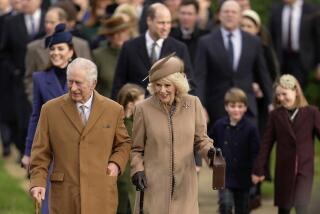God save Queen Elizabeth II -- and then what?
The woman whose countrymen and women are fond of praising her with the phrase “she never put a foot wrong” is celebrating her Diamond Jubilee -- 60 years on the throne. In Britain, only Queen Elizabeth II’s great-great grandmother Victoria reigned longer.
But the glittering mechanisms of sovereignty that now honor the 86-year-old woman who became queen at 25 are just as ready to set the gears in motion when she dies.
Monarchy -- the British monarchy, at least --– has a Darwinian genius for survival and accommodation that has kept it going for more than a millennium.
Photos: Queen Elizabeth II through the years
That can give it the appearance of a certain serene ruthlessness in its perfection, from the funeral caissons to the moment of burial when the Lord Chamberlain ceremonially breaks his white staff of office at his sovereign’s grave.
That’s part of monarchy’s curious, almost atavistic appeal. The London crowds livid that the royal standard, which flies over wherever the monarch is in residence, was not flying at half-staff for the death of the formerly royal-by-marriage Diana, Princess of Wales, didn’t bother to understand that the monarch is never dead. A queen named Victoria died; a king named Edward, her son, instantly took her place. A king named George VI died; the moment his heart ceased to beat, a queen named Elizabeth, his daughter, took his place.
And in the fullness of time, it will happen to Elizabeth, long-lived though she may be -- like her mother, who lived to 101. A father is irreplaceable; a king, a queen, is not. All the embroidered and gilded ciphers that now read ERII will become CRIII, for King Charles III. Only if Charles dies before his mother will the crown pass from Elizabeth to Prince William of Wales. If the throne is not hereditary, if it becomes simply a lifestyle option, it destroys some of its own mystique. And Charles, the Prince of Wales, the heir to the throne, would not endure this long wait to come away with the silver medal.
Charles is already older than King Edward VII, who was 59 when he finally succeeded his mother, Victoria. The future king who gave his name to the brief Edwardian era once supposedly told a man of the cloth that he thanked God for his eternal father, but why did he have to have an eternal mother?
In centuries past, it was treason to “compass the death of the sovereign,” punishable by that grisly, protracted ritual of hanging, drawing and quartering. But nowadays, the gilded trappings of death are part of the mystique. Royal funerals are planned years in advance. The Queen Mother is said to have taken pleasure in tweaking the details of hers, code-named Tay Bridge, a nod to her Scottish heritage; Queen Elizabeth II’s funeral is code-named London Bridge.
The monarchy may not be great at public relations, but it is a wily institution in its own way. It did not weather its own bad kings -- like John, of Magna Carta fame, and Edward VIII, the abdicator -- and survive war and revolution to fold its tents and go quietly.
Perhaps monarchs are more aware of mortality than the rest of us; it is because of mortality that they have their thrones, and because of it that they obsess about who is to follow them. In James Goldman’s brilliantly insightful play and film, “The Lion in Winter,” Elizabeth’s forebear King Henry II acknowledges the inevitable in a way mere mortals do not: “I will die sometime soon. One day I’ll duck too slow, and at Westminster, they’ll sing out “Long live the king” for someone else. I beg you, let it be a son of mine.”
Congratulations, your majesty, and God save this queen -- until the next monarch inevitably comes along.
RELATED:
More to Read
A cure for the common opinion
Get thought-provoking perspectives with our weekly newsletter.
You may occasionally receive promotional content from the Los Angeles Times.











